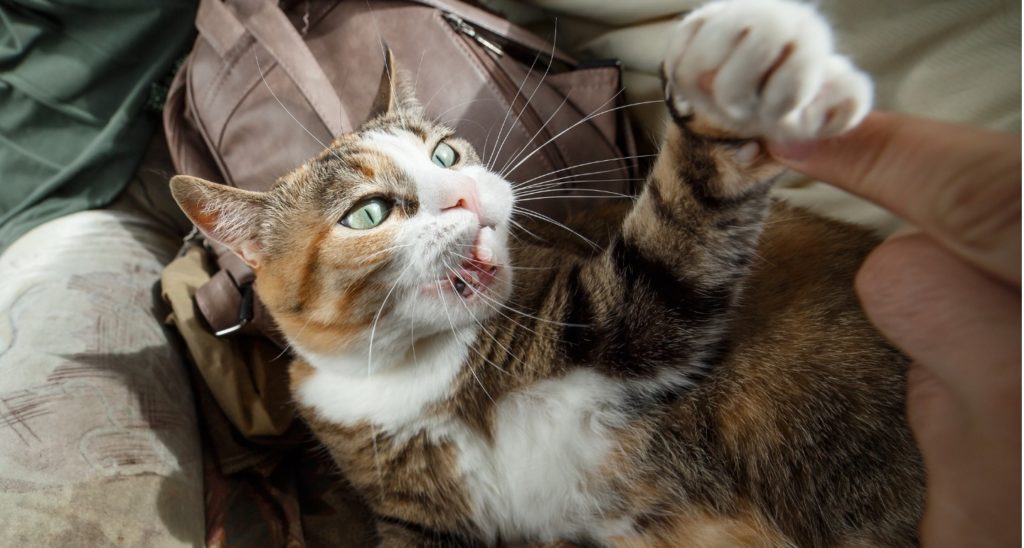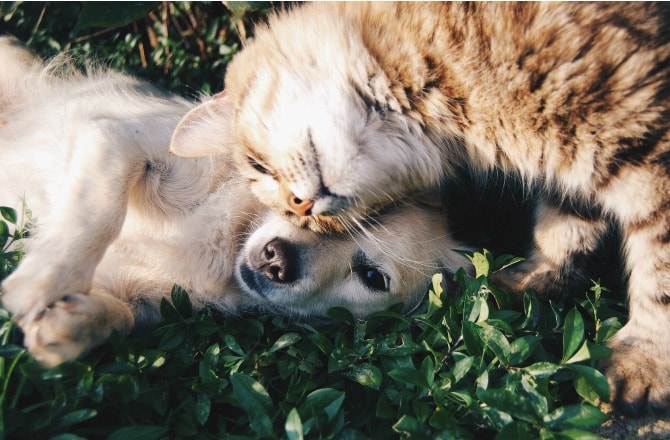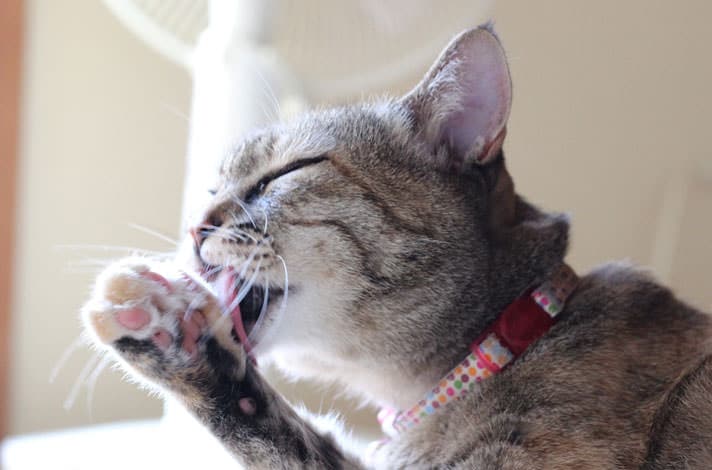After a relaxing vacation away, you’re probably excited to get home and reunite with your beloved cat. You open the door (and your arms!), expecting a big reaction—but not the one you receive! Your usually sweet, loving cat is aggressive, and you’re left wondering, “What happened since I’ve been gone?”
It’s actually pretty common for cats to act strangely or aggressively after their humans return from vacation. They’re sensitive to change and you being gone has not only disrupted their routine but also their bond with you.
Experts recommend slowly reintroducing yourself to your cat and easing them back into their regular routine. And next time you go on vacation, take some extra precautions before you leave as well as during your trip to encourage a warm welcome.
In This Guide:
What Causes Strange Behavior in Cats After an Absence?
Some people might think cats are too independent or aloof to care much about the comings and goings of their humans, but that’s not true.
“Feline separation anxiety is very serious,” says Dr. Carol Osborne, DVM, founder and director of Chagrin Falls Veterinary Center & Pet Clinic in Chagrin Falls, Ohio. “Although it is a well-recognized behavior in dogs, a lot of people, including some vets, don’t realize that other pets experience it. Cats are social and form deep attachments to people.”
Cats with separation issues may act out when you’re gone.
Another reason your cat might be acting strange after a vacation is that cats enjoy routine, and you being gone causes a disruption in that routine.
“Cats are creatures of habit, and when their people leave or if they are boarded, it can be highly disruptive,” says Dr. Taylor Truitt, DVM, CEO of The Vet Set in Brooklyn, New York. “When you return home, they [usually] are confused by yet another change of habit and the new smells you bring in. That can cause aggression.”
As Dr. Truitt mentioned, it’s not only the change in routine that can cause a cat to act out, but also the new smells you’ve picked up during your travels. When your return home, your cat may not realize it’s you at first. This is because cats rely on smell to identify many things, including the people in their life, says Pamela Uncles, a certified pet behaviorist at Companion Animal Behavior in Washington, D.C.
“Cats know who you are by smell,” Uncles says. “When you return from a trip, you smell different, which can cause varying reactions from your cat—including aggression.”
Some cats act out their aggression by biting, scratching or even hiding from their parents, Osborne says.
“They may also cry and otherwise vocalize,” she adds. “Destructive behavior is less common but does happen.”
How To Calm Your Cat When You Return Home
If your cat is acting strange or aggressive after you return from vacation, slowly take steps to help calm them.
The best thing you can do when you return is to let your cat make the first move toward you, says Russel Hartstein, CDBC, CPDT-KA, founder of Fun Paw Care in Los Angeles and Miami. If your cat wants to hide or glare at you, he says to let them do so until they become used to you and your smell again.
Having special treats on hand when you arrive also helps, Dr. Osborne says. Before your cat is aggressive, praise them by tossing a couple treats toward them. Let them enjoy the treat away from you until they acclimate, she says.
“Don’t reward the cats if they are aggressive,” she adds. “Only give rewards when they are calm and exhibit good behavior.”
Easy Ways to Prepare Your Cat for the Next Time You Leave
To best help your cat stay calm during your time away and upon your return, prepare them long before you leave for vacation. You can do this by working with your cat’s veterinarian, getting your cat used to the pet sitter, packing discreetly and staying in touch while you’re away.
Work With Your Cat’s Veterinarian
If you notice any signs your cat is aggressive, consult with your cat’s veterinarian to create a solution before leaving again. Some solutions may be as simple as using calming sprays, like the Comfort Zone® cat spray, and calming treats, like Pet Naturals® Calming® cat chews, to help ease your cat’s anxiety and make them less prone to aggressive cat behavior.
Familiarize Your Cat with Your Pet Sitter
If you hire a pet sitter to stay at your home with your cat, have the person visit your home as often as possible before your departure date, Hartstein recommends.
“When the cat meets different people, [they] can become stressed,” he says. “Ideally, have cat sitters work themselves into your cat’s daily routine. Have them come over, feed them, play with them and become familiar with them [before you leave].”
When you do leave, make sure the pet sitter uses any calming sprays or treats recommended by your vet. Also, ensure the sitter understands your cat’s routine and follows it as closely as possible, Hartstein stresses.
Get more tips to help you prep for a pet sitter.
Pack With Your Cat in Mind
Pack and plan for your trip over a long period of time, Hartstein says, to lessen the stress you exhibit, which can impact your cat. Dr. Osborne agrees, adding that while cats don’t understand what you say, they are able to recognize emotions.
“They may not understand the words, but they have a sixth sense that allows them to recognize fear, anxiety and worry,” Dr. Osborne says.
In addition to how long it takes you to pack, it also matters what you pack. Remember: One of the reasons why your cat might be acting out is that they don’t recognize your smell anymore. That unfamiliarity sometimes causes biting, scratching, snarling and other sudden aggressive cat behavior.
To prevent your cat from not recognizing you when return, Hartstein recommends packing clothes you’ve worn at home in a paper bag. When returning, put those clothes on before entering your home and seeing your cat.
Keep in Touch When Gone
It’s also a good idea to keep in contact with your pet while you’re away, Hartstein says. You can do so by leaving out shirts or socks you’ve worn so your cat can smell them. With today’s technologies, you can even communicate with them through video or audio systems.
While you may have prepared the best you could, sometimes cats just need a few days to realize everything is back to normal. Be patient and don’t take it personally. You are their world; pretty soon they should reacclimate. Next, learn all about cat body language.
Expert input provided by Dr. Carol Osborne, DVM, founder and director of Chagrin Falls Veterinary Center & Pet Clinic in Chagrin Falls, Ohio; Dr. Taylor Truitt, DVM, CEO of The Vet Set in Brooklyn, New York; Pamela Uncles, a certified pet behaviorist at Companion Animal Behavior in Washington, D.C.; and Russel Hartstein, CDBC, CPDT-KA, founder of Fun Paw Care in Los Angeles and Miami.
This content was medically reviewed by a veterinarian.
Cat Communication:
Share:















